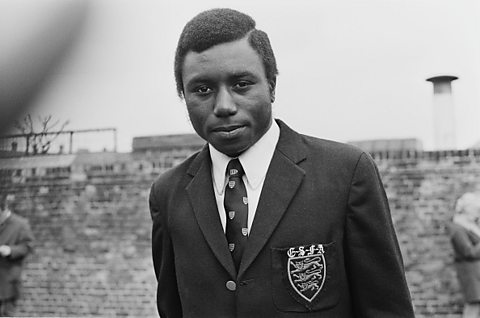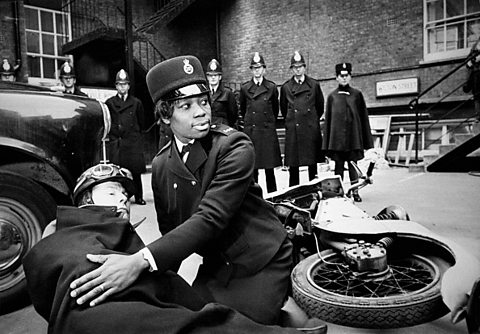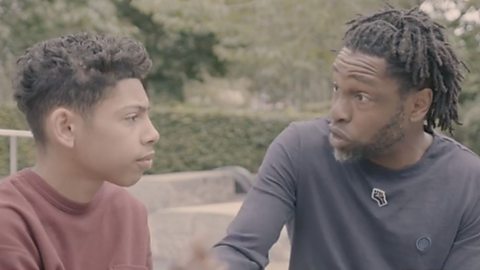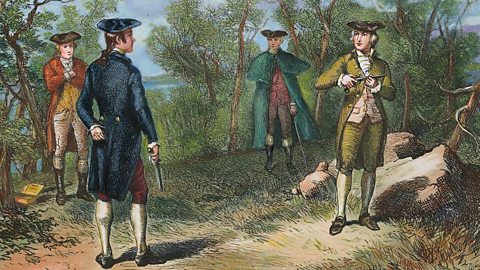The story of black peopleÔÇÖs presence in Britain spans the West Indies, American, African, and European continents.
It's a cross-continental history that began with the forceful removal of black people from Africa as part of the slave trade.
In the centuries that passed, black people around the world overcame huge barriers. Despite those hardships, which for many continue still today, black pioneers from all fields of work went on to make history.
As part of Black History Month, journalist and oral historian Bryan Knight has chosen some of the trailblazers who made significant contributions to BritainÔÇÖs society, culture and history.
England's trailblazing footballer: Benjamin Odeje
In the 1960s, Nigerian-born Benjamin Odeje moved to south-east London with his parents as a young student. A promising footballer, at the age of 15, his talents were spotted by the English Schools' Football Association, who selected him to represent England in 1971.

This call-up was significant as it made Odeje one of the first black football players to represent England at any level. His first match, against Northern Ireland at Wembley in front of 70,000 fans, saw Odeje named man of the match after a 1-0 win for England.
Odeje signed for Charlton Athletic, but never made a first-team appearance. He played for a number of non-league teams in London and continually received racist abuse ÔÇô but has spoken about his determination and commitment to keep playing football.
He was officially recognised as the first black footballer to be capped for England's schoolboys following a public campaign, with Football Association historians confirming his achievement in 2013. He followed in the footsteps of West Ham player John Charles, who eight years earlier had become the first black player to play for England when selected for the under-18 team in 1963.
In the aftermath of Odeje's historic appearance for his country, players like Laurie Cunningham and Viv Anderson went on to become the first to represent England at under-21 and senior levels. Odeje continues to inspire young footballers, running London-based football schools.
An influential performance poet: Jean ÔÇÿBintaÔÇÖ Breeze MBE
Jean ÔÇÿBintaÔÇÖ Breeze came to Britain in 1985 after being invited to attend the International Book Fair of Radical, Black and Third World Books. Growing up in Jamaica, Breeze attended drama school where she embraced her creative talents and studied alongside fellow creatives Michael ÔÇÿMikeyÔÇÖ Smith and Oku Onuora.
Breeze has had a wide-ranging career, including working as a dancer, choreographer and lecturer at Brixton College. However, she is best known for her poetry, which beautifully captured everyday human experiences while highlighting important issues such as mental illness.
In recognition of her work and contribution to BritainÔÇÖs creative industries, Breeze has been awarded an MBE and honorary fellowship at the University of Leicester.
The scientist and activist: Altheia Jones-LeCointe
Throughout BritainÔÇÖs history, there have been many inspiring examples of anti-racism activists who have fought for equality in society. One of the most celebrated campaigners is Trinidadian Altheia Jones-LeCointe.
Jones-LeCointe left Trinidad in 1965 and came to Britain to study for a PhD in biochemistry at University College London. While studying, Jones-LeCointe became concerned with the racism and police brutality she was witnessing at the time, so decided to campaign for change.
She joined various anti-racist organisations such as the Universal Coloured PeopleÔÇÖs Association and the British Black Panther Movement. The anti-racist Mangrove Nine trial, which Jones-LeCointe was involved in, is considered a key moment in British history as it resulted in new laws being enacted which protected the rights of black people in this country. Today, Jones-LeCointe is a leading science researcher and continues the fight for racial equality.
Britain's first black female police officer: Sislin Fay Allen
While working as a nurse in south London, Sislin Fay Allen saw a job advert for the Metropolitan Police who were recruiting men and women. Excited at the prospect of starting a new career, Allen applied and secured an interview where she recalls being the only black person present.
She made national news in 1968 as her appointment was announced, which sadly led to her receiving a barrage of hate mail. Undeterred, she embraced her new role and went on to serve in Croydon, near her family home, and then at Norbury Police Station before moving to the Caribbean with her Jamaican-born husband, where she joined the local police force.

Her appointment is historically significant as she became the first black female police officer in the UK, paving the way for many who followed in her footsteps afterwards.
An iconic photographer: Charlie Phillips
ItÔÇÖs often said that a picture is worth a thousand words.
Without photographers such as Charlie Phillips, we would not be able to fully understand our past. As a teenager, Phillips came to Britain in 1956 with his grandparents. He recalls being given his first camera by an American serviceman; this sparked his interest in photography and motivated him to start taking pictures of his friends.
Phillips taught himself photography skills by extensively reading library books on the subject. At the time, Phillips lived in North Kensington, which had a large West Indian community but was also an economically deprived area of London.
His local surroundings had also been a centre of racial tensions as the black community were frequently targets of racist violence. Armed with his camera, Phillips began documenting the black experience by taking photos of everyday people and the day-to-day activities taking place.
PhillipsÔÇÖ iconic images, which have featured in publications such as Vogue and HarperÔÇÖs Bazaar, are praised for their ability to capture the past and document BritainÔÇÖs multicultural society from the 1960s to the present day.
This article was first published on ┤¾¤¾┤½├¢ Bitesize in October 2020 and has subsequently been updated.

Black History Month: A father and son share stories
Two generations talk about racism, inspirational figures and their lessons at school

Digging into the history behind Hamilton
Slavery, the 1800 election and Angelica Schuyler.

The marvellous universe of diverse superheroes
We take a look at LGBTQ+, Indigenous and anime superheroes.
